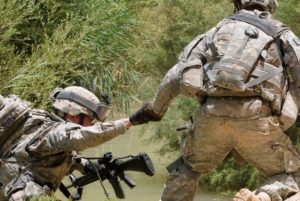By Rose O. Sherman, EdD, RN, NEA-BC, FAAN
The US Army has a program called Battle Buddies. Battle buddies help each other get through difficult situations and stop soldiers from self-isolating when things become challenging. For the army, it has been mission-critical in building teamwork among the troops and helping young soldiers get through Bootcamp and their initial military experience. Some have described it as a “forced best friend at work.” The Battle Buddy program has increased engagement, improved morale, and decreased soldier suicide.
So when I heard Dr. Noreen Brennan talk this past Tuesday on a webinar about their Battle Buddy Program at NYC Health and Hospitals, it seemed like an innovative idea for nurse leaders to consider as we march through the unending battle with COVID-19. Not every nurse needs a battle buddy. Some have very supportive families at home to listen and help ground them. But this is not true for all nurses. The need may be especially great for younger staff who have or are onboarding into nursing at a very challenging time.
Although we have all been in the same COVID storm, we are not in the same boat. Evidence such as that below is indicating that our youngest nurses are having a much tougher time.
- Data from the American Psychological Association (pre-COVID) indicated that Gen Z reports far lower baseline levels of excellent or very good mental health.
- Trait anxiety and stress levels are higher in Gen Z – some speculate it is partially driven by time spent on social media.
- CDC data collected in June 2020 indicates that Gen Z reported significantly higher stress, anxiety, depression, and suicidal ideation during COVID.
- Recent data from a large sample size survey NurseWellbeingAtRisk-Final2020-web indicates that Gen Z nurses were the most likely (57.3%) to report that COVID-19 had negatively impacted their overall well-being. Gen Z was also the least likely (only 23.5%) to report managing work-related stress and anxiety or to decompress after work (only 19.2% could).
- Only 15.4 % of Gen Z nurses in the Nurse Well Being Survey felt comfortable discussing their well-being with their manager versus 59.6% of Baby Boomer nurses.
A Battle Buddy program acknowledges that what nurses are experiencing right now in their work is challenging. Many senior leaders have described COVID as similar to the type of chaos and stress one might see in a battle. A great place to pilot a Battle Buddy program would be incorporating it into a residency or new graduate transition program. Battle buddies ideally work on the same unit and would be scheduled together when possible (the army even encourages soldiers to sign up with their friends and go through boot camp together – something to think about with new graduates). They would be given time, taught coaching skills, and be encouraged to do the following:
- Learn about one another’s lives and personal interests.
- Discuss ways to maintain a healthier lifestyle and be an accountability partner.
- Establish ways to connect to communicate.
- Choose a social activity that they do together.
- Have crucial conversations with one another when things are not going well.
We know from the work of Gallup that having a best friend at work (even if it is initially forced) results in both higher engagement and retention. Nurse leaders tell me that new graduate turnover has skyrocketed during COVID. Every new idea is worth considering, so why not think about a Battle Buddy program for your organization.
© emergingrnleader.com 2021
BRAND NEW WEBINAR Flyer Become the Boss No One Wants to Leave Nurse Retention in Turbulent Times
Give your leadership team the gift of a highly rated webinar – Nursing Leadership in 2021: Rebooting after a Life-Quake A Nursing Leadership Reboot Workshop.
Read the Nurse Leader Coach – Available at Amazon and Other Book Sellers.
Recommended Book by the Association of Critical Care Nurses – The Nuts and Bolts of Nursing Leadership: Your Toolkit for Success




 LinkedIn
LinkedIn Instagram
Instagram